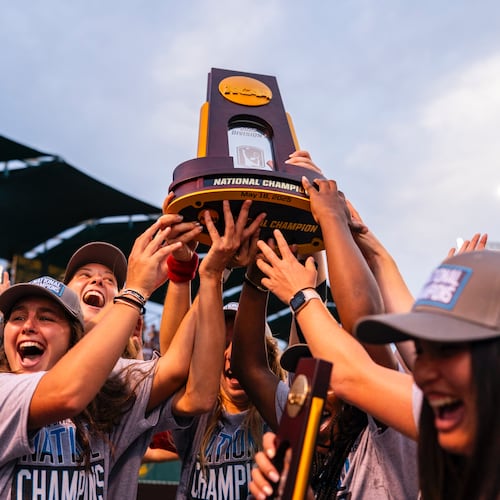Atlanta’s claim to being the center of the college football universe happened because of a series of events -- some that took years, some that took mere moments -- combined with the city’s proven history as one of the top convention sites in the U.S.
On the sporting side, the claim is backed by annually hosting at least one important game to kick off the season, and ending with another important game, the Chick-fil-A Peach Bowl, in the College Football Playoff. This year, it will be the semifinal between No. 1 Georgia and No. 4 Ohio State at Mercedes-Benz Stadium. In between those games are at least one more Chick-fil-A Kickoff game, borne of a slight, the SEC Championship game and the Celebration Bowl, which crowns the champions of HBCU football programs. It will host the CFP Championship game in 2025. Atlanta will be the first city to repeat as host.
Spiritually holding everything together is the College Football Hall of Fame, which moved to Atlanta from South Bend, Indiana, after someone felt a famous Alabama coach was underrepresented.
Economically, the events are supported by a hospitality and tourism industry that is projected to result in more than $100 million in impact this year and more than $1.2 billion to the state since 2002, according to Peach Bowl officials.
“Where would football be without Atlanta?” said William Pate, the president and CEO of the Atlanta Convention and Visitors Bureau. “It’s the largest population center, arguably the most emotional football fans in country.”
It’s a big universe. Atlanta is the center. Here are a few anecdotes about that big boom:
The Hall of Fame. After the Olympics, the Atlanta Sports Council put together a plan to take advantage of the facilities constructed for the Games in an attempt to make Atlanta, in then-council President Gary Stokan’s words, “the sports capital of the world.” The council bid on everything from championships in wrestling, to volleyball, to Super Bowls.
Those were the events, some of which were successfully landed.
To cement the bona fides as a sports go-to place, more was needed. That more included thinking about the College Football Hall of Fame and developing a NASCAR Hall of Fame.
The College Football Hall of Fame’s move started, oddly enough, because of a sleight to the famous Alabama coach Paul “Bear” Bryant more than 20 years ago.
Stokan was touring the College Football Hall of Fame, then located in South Bend, with former Alabama athletic director Mal Moore in 2001. As they toured the museum, Moore noticed that there was nothing dedicated to Bryant, winner of six national titles with the Crimson Tide.
“How can that be?” Stokan remembers Moore asking.
Stokan quickly realized that if the Hall were moved to Atlanta, it could at least triple the 60,000 in attendance it was getting.
Around the same year, there was an idea to develop a NASCAR Hall of Fame in Atlanta. NASCAR liked the idea of a Hall of Fame. Instead of pledging it to Atlanta, it opened the bidding to several cities.
Stokan had to pull his plan for the College Football Hall of Fame because he didn’t want the bids competing against each other. He already had a site ready to go, where the solar panels are now at Skyview Atlanta.
The NASCAR endeavor had the support of Governor Sonny Perdue, as well as Atlanta-based businesses Turner Broadcasting, Home Depot, Coca-Cola and NAPA, which were sponsors of cars.
Stokan took the proposed site for the College Football Hall of Fame and gave it for the NASCAR site. Despite all the support, Charlotte was awarded the NASCAR Hall of Fame in 2006.
Stokan resurrected his pursuit of the College Football Hall of Fame. He went to the National Football Foundation and gave them the details of his proposal. But he said there could be no bidding.
Perdue pledged $20 million during one of the worst budgets in state history in 2009 to build a parking deck on state property for the Hall.
“I’m a great believer that Gary Stokan has never gotten the credit he’s due,” said Bob Hope, president and co-owner of Hope and Beckham and long-time sports executive in the city. “It was kind of comical about Atlanta being the NASCAR Hall of Fame, and Gary was a voice in the wilderness, saying ‘Hey, let’s get the College Football Hall of Fame.’”
The NFF board eventually voted 39-1 in 2009 to move the Hall to Atlanta.
The spiritual center of the sport was moving to Atlanta. It opened in 2014, across from Centennial Olympic Park.
“We firmly believe that Atlanta is the capital of college football,” College Football Hall of Fame President Kimberly Beaudin said.
The Chick-fil-A Kickoff games and College Football Playoff. As the College Football Hall of Fame plan was developing, the Bowl Coalition Series in 2006 put out a bid to add another bowl.
Atlanta and Dallas tried but were foiled when the four big bowls, Rose, Sugar, Orange and Fiesta, pushed to allow double-hosting on a rotational basis.
Atlanta and Dallas were out.
A year later, the NCAA legislation added a 12th game for college football. Not one who gives up easily, Stokan went to the Peach Bowl board and said if the BCS won’t let us in on at season’s end, let’s do a BCS-type game on the front end.
He went to ESPN, pitching what would become the Chick-fil-A Kickoff game as the “Daytona 500 of the college football season.” That pitch resulted in Stokan receiving a cease-and-desist letter from the race’s organizers.
It’s one thing to have the idea, it’s another to make the idea work.
Stokan needed teams. Really good teams that would pack the Georgia Dome and generate TV interest.
Stokan called Terry Don Phillips, the athletic director at Clemson. He was in.
Stokan then called Nick Saban, who was in his second year Alabama.
Saban owed Stokan a favor because in 2000, the Peach Bowl selected unranked LSU, despite the board’s reservations, to play No. 14 Georgia Tech. Stokan told the board that they could fire him if LSU didn’t perform well in the stands and on the field. LSU sold more than 16,000 tickets on the first day of ticket sales. The Tigers also won the game. Playing in that game gave Saban an in to recruits in Georgia and the Southeast. The next recruiting class formed the nucleus of the 2003 national championship team.
Keeping this in mind, Stokan asked Saban if he was interested in playing in a Kickoff game. The Tide had gone 7-6 in Saban’s first season. Saban told him if he can win recruiting in Alabama and finish second in Georgia, he would lead Alabama to a national championship.
The Tide were in.
Alabama won the game.
They came back next year in 2008 and defeated Virginia Tech and followed that with Saban’s first national title with the Tide.
The Chick-fil-A Kickoff, which usually included teams from the SEC and ACC, expanded to two games in 2012, ‘14, ‘17, ‘21 and earlier this year. The game has featured teams ranked among the Top 25 in 17 of its 19 games. Fifteen of the games had an announced attendance of at least 68,000.
When the BCS was replaced in 2014 by the College Football Playoff, Atlanta was added into the rotation. It held its first game in 2016.
“Those givebacks, our commitments to college football with the Hall and Kickoff games, those gave us the entre to the College Football Playoff when they decided to six games,” Stokan said.
The expansion of the playoffs from four to 12 in 2024-25 means that the Peach Bowl will host no less than a quarterfinal game every year.
The city and the bowl have come a long way from being an afterthought nationally.
“Every year you are going to have significant championship games here, or significant playoff games here, that will impact the national championship,” Pate said. “Atlanta always rallies around those games.”
The operations. The games, and museum, wouldn’t be in Atlanta if not for its ability to handle tens of thousands of visitors.
Whether it’s executives from the Falcons, Atlanta United or the Peach Bowl, the spiel is familiar: three major interstates run through the city, public transportation, an airport that can move 80% of the nation’s population to the city within a two-hour flight, an airport that also is a MARTA ride away from downtown, thousands of hotel rooms within walking distance, lots of green space, lots of restaurants, etc.
“Atlanta is a convention town,” Hope said. “The convention bureau might say the football games aren’t conventions, but they are recurring, and they bring a ton of people in.”
According to Peach Bowl organizers, those people produce tax revenues from that game and the Kickoff games of almost $80 million between 1999-2021.
If that doesn’t seem like a lot, it’s because it is a very small percentage of the state’s and city’s overall tax revenues, according to Bruce Seaman, an associate professor of economics at Georgia State and who produces the economic impact studies of the games. But the revenues are important because they come at holiday seasons around Labor Day, Christmas and New Year’s, when there isn’t as much tourism.
“This community is really good at what we all do from the state level to city level to private groups, to hospitality, college football is on a high level with regard to people’s attention and focus,” said Dan Corso, President of the Atlanta Sports Council.
The games also showcase the city during breaks in the game, when reels of attractions such as the Georgia Aquarium, The College Football Hall of Fame and the National Center for Civil and Human Rights are highlighted.
“You can’t buy that publicity,” Hope said.
Put it all together, and that’s why Atlanta is the center of the college football universe.
“It’s a reflection of culture in this state, of the passions, and obsession with the sport of college football,” Corso said.
About the Author
Keep Reading
The Latest
Featured


